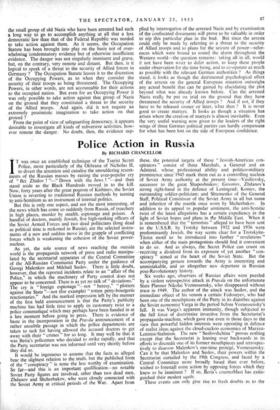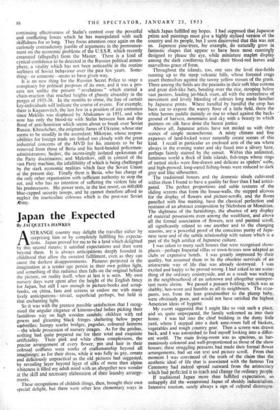Police Action in Russia
By RICHARD CHANCELLOR IT was once an established technique of the Tsarist Secret Police, more particularly of the Okhrana of Nicholas II, to divert the attention and canalise the smouldering resent- ments of the Russian masses by raising the ever-popular cry of " Bei Zhidov ! "—" Down with the Jews ! "—and then stand aside as the Black Hundreds moved in to the kill. Now, forty years after the great pogrom of Kishinev, the Soviet Union is reverting to traditional Russian methods by turning w anti-Semitism as an instrument of internal politics.
But this is only one aspect, and not the most interesting, of the news which has come so suddenly from Russia, of treachery in high places, murder by stealth, espionage and poison. A handful of doctors, mainly Jewish, five high-ranking officers of the Soviet Armed Forces and two dead politicians (long dead as political time is reckoned in Russia), are the selected instru- ments of a new and sudden move in the grapple of conflicting forces which is weakening the cohesion of the Soviet power- nucleus. '
As yet, the sole source of news reaching the outside world is the propaganda network of press and radio manipu- lated by the secretarial apparatus of the Central Committee of the All-Russian Communist Party under the guidance of Georgi Malenkov and Mikhail Suslov. There is little doubt, however, that the reported incidents relate to an "affair of the Police," in which the machinery of Party control does not appear to be concerned. There is as yet no talk of "deviations." The cry is "foreign espionage "—not "heresy," "plotters against the State "—not (for example) "rotten petty-bourgeois reactionaries." And the marked impression left by the manner of the first bald announcement is that the Party's publicity machine has had little time to apply its customary twist to a police commudique which may perhaps have been handed in at a late moment before going to press. There is evidence of haste in the incorporation in the Pravda announcement of a rather unsubtle passage in which the police departments are taken to task for having allowed the accused doctors to get away with their " crimes ' for so long. It may well be that it was Beria's policemen who decided to strike rapidly, and that the Party secretariat was not informed until very shortly before they did so. It would be ingenuous to assume that the facts as alleged bear the slightest relation to the truth, but the published form of the " conspiracy " is none the less worthy of examination. So far—and this is an important qualification—no notable Soviet Party figures are involved, other than two dead men, Zhdanov and Shcherbakov, who were closely connected with the Soviet Army at critical periods of the War. Apart from these, the potential targets of these "Jewish-American con- spirators" consist of three Marshals, a General and an Admiral, whose professional ability and politico-military prominence since'1945 mark them out as a controlling nucleus of Soviet Army authority at the present time—Vasilievsky, successor to the great Shaposhnikov; Govorov, Zhdanov's strong right-hand in the defence of Leningrad; Koniev, the outstanding soldier-politician; and Shtemenko of the General Staff, Political Commissar of the Soviet Army in all but name and inheritor of the mantle once worn by Shcherbakov. In addition to its appeal to popular sentiment, the anti-Semitic twist of the latest allegations has a certain expediency in the light of Soviet hopes and plans in the Middle East. When it is remembered that the " terrorists " alleged to have been sent to the U.S.S.R. by Trotsky between 1932 and 1936 were predominantly Jewish, the way seems clear for a Trotskyite- Titoist motif to be introduced into further " revelations " when either of the main protagonists should find it convenient to do so. And as always, the Secret Police can count on --receiving a dividend from its exposure of yet another " con- spiracy " aimed at the heart of the Soviet State. But the accompanying gesture towards the Army is interesting and unmistakable, and an altogether new departure in Russian post-Revolutionary history. Six weeks ago, observers of Russian affairs were puzzled by a violent retrospective attack in Pravda on the unfortunate State Planner Nikolai Voznessensky, who disappeared without trace in 1949. The author of the attack was Suslov, and the immediate object of his venom a certain Fedoseyev, who had been one of the mouthpieces of the Party in its diatribes against the Soviet economist Varga in the period before Voznessensky's fall. It was Varga's apparent immunity, though subjected to the fall force of doctrinaire invective from the Secretariat's propaganda-machine, which gave rise even in those days to the view that powerful hidden interests were operating in defence of realist ideas against the cloud-cuckoo economics of Marxist- Leninist-Stalinism. The new " Suslovshchina " proves nothing except that the Secretariat is leaning over backwards in its efforts to discredit one of its former mouthpieces and retrospec- tively to disavow Malenkov's one-time protege, Voznessensky. Can it be that TvIalenkov and Suslov, their powers within the Secretariat curtailed by the 19th Congress, and faced by a ' Central Committee more broadly based than ever before, wished to forestall some action by opposing forces which they knew to be imminent ? If so, _Beria s counterblast has extin- guished their modest squib. These events can only give rise to fresh doubts as to the continuing effectiveness of Stalin's control over the powerful and conflicting forces which he has manipulated with such skilfulness for so long. They focus attention once again on the curiously contradictory jumble of arguments in the pronounce- ment on the economic problems of the U.S.S.R. which recently emanated (allegedly) from the Master. There is a kind of cynical confidence to be detected in the Russian political atmos- phere, a vitality which has not been noticeable in the routine surliness of Soviet behaviour over the past few years. Some- thing—or someone—seems to have given way. It is no new thing for the Russian Secret Police to stage a conspiracy for political purposes of its own, and it was a pro- cess not unlike the present " revelations " which started a chain-reaction that reached heights of ghastly absurdity in the purges of 1935-38. In the months to dune, the fate of certain key-individuals will indicate the course of events. For example, there is Kaganovitch, the last Jew in a position of any eminence since Mekhlis was displaced by Abakumov in 1951, and who now has only the blood-tie with Stalin between him and the flood of anti-Semitism which seems about to break over Soviet Russia; Khrushchev, the enigmatic Janus of Ukraine, whose star seems to be steadily in the ascendant; Mikoyan, whose respon- sibilities for foreign trade are linked too closely with the great industrial concerns of the MVD for his interests to be far removed from those of Beria and his hard-headed policemen- administrators; Suslov, the increasingly isolated spokesman of the Party doctrinaires; and Malenkov, still in control of the vast Party machine, the infallibility of which is being challenged by the stark economic realities which face the Soviet Union at the present day. Finally there is Beria, who has charge of the only. other organisation with sufficient authority to stop the rot, and who has no intention of suffering the violent fate of his predecessors. His power rests, in the last resort, on 600,000 blue-capped security troops, and he cannot therefore afford to neglect the inarticulate colossus which is the post-war Soviet Army.



































 Previous page
Previous page